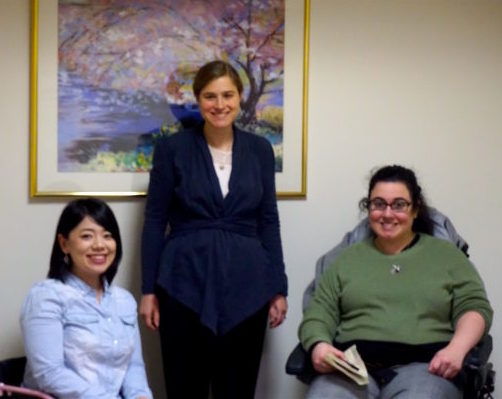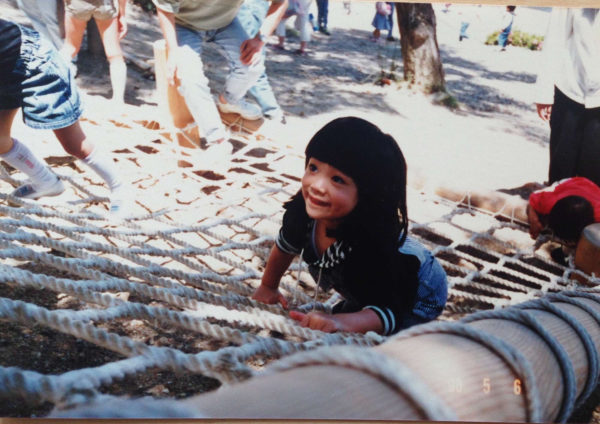This article is also available in: 日本語
In April, I visited Boston and interviewed for my research. The very first place I visited was Boston Center for Independent Living, which supports people with disabilities to live in a community independently. I was honored to have the opportunity to talk with Allegra Stout, Community Organizer, and Sarah Kaplan, Transition Internship Coordinator.

When I visited San Francisco in January, I had interviewed Independent Living Resource Center San Francisco (*1). Many cities in the US have a center for independent living for local people with disabilities. The first center of independent living in the nation was established in Berkeley in California. Then the second one is here in Boston.
One of the strengths of a Center for Independent Living is that more than half of staff and board members are composed by people with disabilities. The staff and board members’ disabilities vary. They can give effective advices and support for consumers with disabilities through personal experiences as a person with disabilities. The interviewees at Boston Center for Independent Living, Allegra has learning disabilities and chronic illness. Sarah has cerebral palsy, in addition to learning and emotional disabilities.
Through the interview, I became interested in Transition Internship Program which is in its sixth years. The program provides paid internship opportunities for high school students with disabilities. Until last year, this program was organized for 7 to 10 weeks during summer. However, this year new term was added in Spring. The internship sites vary, and include profit and non-profit organizations, local companies, educational institutions, and governmental agencies.
Just like a regular job hunting process, Transition Internship Program is set with the limited number of trainees. The program has a screening process and requires applicant interviews. Last year Transition Internship Program opened 25 seats and got 102 applications. After the first screening process, 57 people received the opportunity to have an interview. The selected trainees are asked what kind of job they want to do. The important point is that Transition Internship Program gives an opportunity based on what trainees want to do, not what they can do. Even if the job looks difficult for certain trainees, Transition Internship Program still arranges a internship site as per the trainee’s preference. By doing so, the outcome will be much better and successful than working where the trainees are not interested in that much. In addition, those trainees would be able to challenge new things and see their abilities and potential within themselves.

Most people without disabilities would experience both success and failure since they are little, and get to know what they are good at and what they want to do. However, many of people with disabilities grow up in a protected world. Adults around people with disabilities, especially parents, are often worried about potential struggles that their children could face and try to protect their children from risk.
While the Transition Internship Program provides training to all of the interns, they are not opposed to “risk with dignity.” They recognize that everyone has a right to try something new even if it could be a challenge for them. If they succeed, it is their success, and if they make mistakes, they can still learn from them. All experiences are meaningful and help people grow.
Risk is possibility of failure, but risk is also possibility of success.
Sarah said.

In Transition Internship Program, job coaches (*2) would consult and support the trainees. The trainees do not only have practical work, but also learn soft skills for a job such as professional email writing, answering phone and self-advocating. The trainees learn about disclosure of disability, because consequence would be different when disability is disclosed or not disclosed. In the US, if an applicant has a disability they can choose whether or not to disclose their disability to their employer. Employers are prohibited from asking any questions about disability or a potential disability. However, interviewers may ask all applicants if they are able to perform the essential functions of a job.
Sarah is a Moon Rider (=Wheelchair user). She said,
In my case, for example, an interviewer might ask me that ‘In this position, you need to visit clients’ homes. If their houses have stairs, how would you access them?’ Then I will think about solutions and offer them to the interviewer, such as ‘If their house has stairs, I will do a Skype meeting. If the client doesn’t have internet access, I would consult with colleagues to ask them to visit those clients, and I would take other clients of colleagues whose houses are accessible.’ I should not say that ‘I cannot go upstairs, but please hire me.’ That is not a solution. To negotiate with employers like this, applicants need to get an interview at first. To get an interview, it is important for you to decide if you want to disclose your disability or not. Even if you disclose, you still need to manage when and how you disclose your disability.
In the US, compulsory education ends at high school. High school students with disabilities are still very protected by the school system. Most decisions are made by their parents. However, the parents cannot go to job interviews on behalf of their children. After graduation from high school, those students with disabilities would need to communicate with employers by explaining how their interests and skills matches the employer’s needs. It doesn’t work if students just say what they want to do in the actual interview.
Communication skills in job interviews cannot be gained naturally. The staff at the Boston Center for Independent Living are a group of disability experts. Based on their job hunting experience, those trainees would be able to know the reality of employment for people with disabilities and how to manage better while chasing ideal dreams. Even if trainees experience failures, it is good, too. Life is built by success and failure. Students with disabilities can be prepared to be adults by experiencing both success and failure.
*1 You can read the reports of Independent Living Resource Center San Francisco
*2 Job coaching refers to the training of an employee by an approved specialist, who uses structured intervention techniques to help the employee learn to perform job tasks to the employer’s specifications and to learn the interpersonal skills necessary to be accepted as a worker at the job site and in related community contacts. In addition to job-site training, job coaching includes related assessment, job development, counseling, advocacy, travel training and other services needed to maintain the employment.
